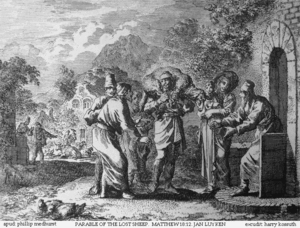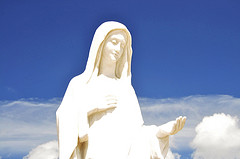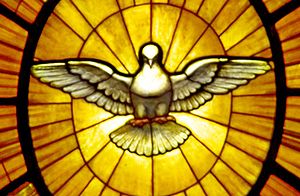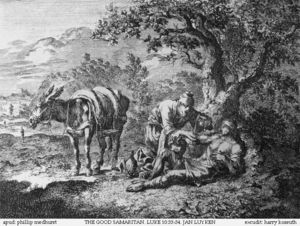The Gospel for January 9, 2011 is from Matthew 3:13-17 — the Baptism of Jesus which is also the First Luminous Mystery of the holy rosary. When you pray this mystery, remember verse 3:17 where God tells John the Baptist and others gathered, “This is my beloved Son, with whom I am well pleased.”
Very few people in the history of the human kind have ever directly heard the voice of God. Imagine how great and at the same time terrifying that experience must have been for those present at Jesus’ baptism. I know many times we may wish that God would talk to us in a more direct way such as through a booming voice from the sky. But would you be truly prepared for such an event? Would you be willing to change your entire life since you could no longer be ignorant of God’s existence, His laws, and the divine nature of Jesus Christ?
And yet I wonder how many people present at Jesus’ baptism were also there at Pontius Pilot’s palace yelling, “crucify Him!” That shows just how stubborn (and stupid) we can act at times. Even when we hear God’s Word and know what God expects of us, we turn around and either abandon Him or outright attack Him or His Church. We do this all the time. We know what is right and wrong in most common cases. We know what the Church teaches about various moral, ethical, and social issues. And yet so often we flagrantly act contrary to God’s Will. It makes me wonder if we would even convert our sinful ways if God did speak to us as a voice in the sky. After all, God would be competing with Oprah, television, and the media to whom we usually give more attention.
None of us have heard God as a booming voice in the sky. But that doesn’t mean God doesn’t speak to us. He speaks through the Magisterium of the Catholic Church. He spoke through the saints. And God speaks to us through prayer. When it really comes down to it, we really don’t have much of an excuse to not keep God’s laws because He constantly communicates them to us.
When we pray the First Luminous Mystery of the rosary and recall Jesus’ baptism, let us also recall our own baptism. Remember that through our baptism God calls us to live in His grace and one day be with Him in Heaven. At our baptism, we were about as close to God as we ever can be in this life because our souls are wiped clean of all sin and we did not face any time in Purgatory. That is the state God desires for our souls. Trying to live in that state should be our ultimate goal in life. That is what this Gospel and rosary mystery remind us. In your prayers, really listen to what God says to you. When you silence all those distractions and open your heart to God then you may actually realize that God does speak to you with a booming voice.
Related articles
- The Spirit of Justice — A Lectionary Meditation (pastorbobcornwall.blogspot.com)
- Unraveling Jesus’ Life and Gospel Through the Four Sets of Mysteries (prweb.com)




















